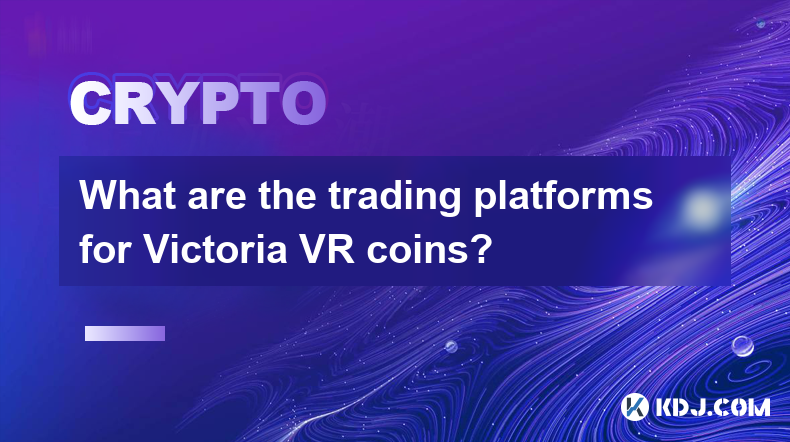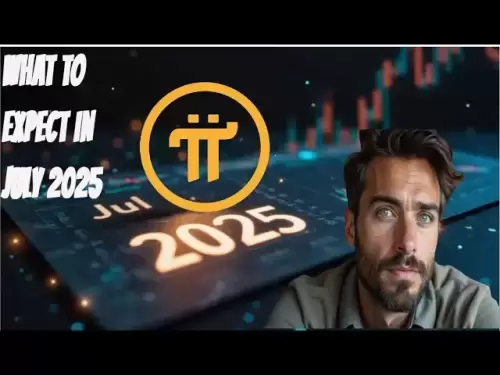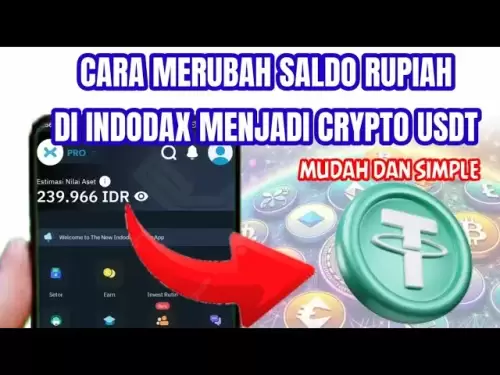-
 Bitcoin
Bitcoin $106,731.2224
-1.05% -
 Ethereum
Ethereum $2,444.9804
-1.20% -
 Tether USDt
Tether USDt $1.0003
0.01% -
 XRP
XRP $2.1882
0.09% -
 BNB
BNB $651.1435
-0.61% -
 Solana
Solana $148.3252
-2.09% -
 USDC
USDC $1.0000
0.01% -
 TRON
TRON $0.2787
0.55% -
 Dogecoin
Dogecoin $0.1598
-3.16% -
 Cardano
Cardano $0.5520
-2.43% -
 Hyperliquid
Hyperliquid $39.0960
-2.64% -
 Bitcoin Cash
Bitcoin Cash $516.9519
2.98% -
 Sui
Sui $2.7011
-2.95% -
 Chainlink
Chainlink $13.0582
-1.71% -
 UNUS SED LEO
UNUS SED LEO $8.9250
-2.53% -
 Stellar
Stellar $0.2359
-0.18% -
 Avalanche
Avalanche $17.3856
-3.73% -
 Toncoin
Toncoin $2.8095
-3.56% -
 Shiba Inu
Shiba Inu $0.0...01121
-1.95% -
 Litecoin
Litecoin $85.2795
-0.85% -
 Hedera
Hedera $0.1471
-2.15% -
 Monero
Monero $319.8004
1.12% -
 Dai
Dai $1.0001
0.01% -
 Ethena USDe
Ethena USDe $1.0001
0.02% -
 Bitget Token
Bitget Token $4.5344
-1.07% -
 Polkadot
Polkadot $3.3224
-2.96% -
 Uniswap
Uniswap $6.9697
-2.75% -
 Aave
Aave $266.1658
-2.25% -
 Pepe
Pepe $0.0...09414
-3.41% -
 Pi
Pi $0.4913
-3.29%
What are the trading platforms for Victoria VR coins?
Reputable trading platforms for Victoria VR (VR) Coins include Binance, Coinbase, Huobi Global, KuCoin, and Kraken. These platforms offer varying features and benefits, so it's important to evaluate their liquidity, fees, security measures, trading features, and customer support to determine the best fit.
Dec 26, 2024 at 04:50 pm

Key Points
- Understanding the Victoria VR Coin and Its Potential
- Identifying Reputable Trading Platforms for Victoria VR Coins
- Exploring the Features and Benefits of Each Trading Platform
- Evaluating Platform Security and Reliability
- Navigating the Trading Process and Execution
Detailed Guide to Trading Victoria VR Coins
Understanding the Victoria VR Coin
Victoria VR (VR) is a cryptocurrency designed for virtual reality (VR) and augmented reality (AR) experiences. It aims to provide a platform for the creation and monetization of VR/AR content, as well as facilitate transactions within VR/AR environments. VR coins have the potential to play a significant role in the emerging VR/AR industry.
Identifying Reputable Trading Platforms for Victoria VR Coins
Many cryptocurrency exchanges and trading platforms support the trading of Victoria VR coins. However, it is essential to carefully evaluate these platforms before selecting one for trading VR coins. Factors to consider include platform security, reputation, liquidity, fees, and customer support.
Binance
Binance is the largest cryptocurrency exchange by trading volume, offering a wide selection of cryptocurrencies, including Victoria VR coins. Binance is known for its high liquidity, low fees, and advanced trading features. However, it is important to note that Binance has been involved in controversies related to regulatory compliance and security, so due diligence is required.
Coinbase
Coinbase is one of the most popular cryptocurrency exchanges among beginners, due to its user-friendly interface and focus on security. Coinbase offers a limited selection of cryptocurrencies, but it includes Victoria VR coins. Coinbase charges higher fees than some other exchanges, but its reputation and security measures make it a suitable option for those prioritizing ease of use and safety.
Huobi Global
Huobi Global is a leading cryptocurrency exchange based in Asia, known for its high liquidity and diverse range of trading pairs. Huobi supports the trading of Victoria VR coins, as well as various other cryptocurrencies. Huobi charges reasonable fees and offers a range of trading tools and advanced features. However, users may need to consider potential regulatory uncertainties associated with its operations in certain jurisdictions.
KuCoin
KuCoin is a cryptocurrency exchange that has gained popularity among experienced traders and active investors. KuCoin offers a wide selection of cryptocurrencies, including Victoria VR coins. The platform is known for its competitive fees, support for multiple payment methods, and advanced trading features such as margin trading and futures trading. However, KuCoin may not be as suitable for beginners due to its complex trading interface.
Kraken
Kraken is a reputable cryptocurrency exchange known for its high security standards and regulatory compliance. Kraken offers a range of cryptocurrencies, including Victoria VR coins. The platform charges higher fees than some competitors, but it provides advanced trading features, robust security measures, and a reliable track record.
Exploring the Features and Benefits of Each Trading Platform
Each trading platform offers unique features and benefits that cater to different user needs. When choosing a platform, consider the following factors:
- Liquidity: Refers to the volume of trading activity for a particular cryptocurrency on the platform. Higher liquidity ensures faster and smoother execution of trades, reducing slippage and improving price stability.
- Fees: Exchanges charge various fees for trading operations, including maker fees (for placing orders that add liquidity to the market) and taker fees (for executing orders that remove liquidity from the market). Be sure to compare fee structures to minimize trading costs.
- Security: Robust security measures, such as two-factor authentication, cold storage, and regular security audits, help safeguard user funds from unauthorized access or hacks.
- Trading Features: Advanced trading features, such as margin trading, stop-loss orders, and technical analysis tools, can enhance trading strategies and risk management.
- Customer Support: Responsive and reliable customer support is crucial for resolving any issues or inquiries. Look for platforms with multiple communication channels (e.g., live chat, email, phone) and a track record of providing timely and helpful assistance.
Evaluating Platform Security and Reliability
The security and reliability of a trading platform are paramount in protecting user funds and personal data. Here's a checklist for evaluating platform security:
- Exchange Ownership and Reputation: Research the background, experience, and reputation of the exchange's owners and management team.
- Regulatory Compliance: Check if the exchange is registered with relevant regulatory authorities, which provides some assurance of adherence to industry standards and regulations.
- Security Protocols: Ensure the exchange employs industry-standard security protocols, such as SSL encryption, two-factor authentication, and cold storage of user funds.
- Insurance Coverage: Some exchanges offer insurance policies to protect user funds in case of security breaches or platform failures.
- Track Record: Consider the exchange's track record in terms of security incidents and customer feedback.
Navigating the Trading Process and Execution
Once you have selected a suitable trading platform, familiarize yourself with the trading process:
- Account Creation: Open an account on the platform by providing basic personal information and undergoing identity verification procedures.
- Deposit Funds: Transfer funds into your trading account using supported payment methods (e.g., bank transfer, credit card, cryptocurrencies).
- Place an Order: Decide on the type of order you want to place (e.g., market order, limit order, stop-loss order). Select the cryptocurrency (in this case, Victoria VR coins) and specify the quantity and price (if applicable).
- Order Execution: The platform matches your order with other orders in the order book and executes the trade at the specified price or better.
- Order Status Monitoring: Track the status of your order using the platform's trading interface until it is filled or canceled.
FAQs
Q: Which trading platform is the best for trading Victoria VR coins?
A: The best platform depends on individual needs and preferences. Binance offers high liquidity, while Coinbase is user-friendly and secure. Huobi Global has a wide range of trading pairs, and KuCoin is suitable for experienced traders.
Q: Are there any fees associated with trading Victoria VR coins?
A: Yes, trading platforms charge various fees, including maker fees, taker fees, and withdrawal fees. Be sure to compare fee structures to minimize costs.
**Q: How can I ensure the security of my Victoria VR
Disclaimer:info@kdj.com
The information provided is not trading advice. kdj.com does not assume any responsibility for any investments made based on the information provided in this article. Cryptocurrencies are highly volatile and it is highly recommended that you invest with caution after thorough research!
If you believe that the content used on this website infringes your copyright, please contact us immediately (info@kdj.com) and we will delete it promptly.
- UniCredit, Bitcoin, and BlackRock ETF: A New Era of Crypto Investment?
- 2025-07-02 00:30:12
- UniCredit, Bitcoin ETF, and BlackRock: A New York Minute on Crypto's Big Players
- 2025-07-02 00:30:12
- Boba Network: $70M Funding & FTX Recovery – What's the Deal?
- 2025-07-01 22:50:11
- Sentiment Data's Hidden Gems: Top Performing Cryptos You're Missing
- 2025-07-01 23:10:15
- Deutsche Bank's Bitcoin Custody Play: A New York Minute on Crypto Services
- 2025-07-01 22:30:12
- Avalanche, Partnership, and Bitcoin: A New York Minute on Crypto Convergence
- 2025-07-01 23:10:15
Related knowledge

How to customize USDT TRC20 mining fees? Flexible adjustment tutorial
Jun 13,2025 at 01:42am
Understanding USDT TRC20 Mining FeesMining fees on the TRON (TRC20) network are essential for processing transactions. Unlike Bitcoin or Ethereum, where miners directly validate transactions, TRON uses a delegated proof-of-stake (DPoS) mechanism. However, users still need to pay bandwidth and energy fees, which are collectively referred to as 'mining fe...

USDT TRC20 transaction is stuck? Solution summary
Jun 14,2025 at 11:15pm
Understanding USDT TRC20 TransactionsWhen users mention that a USDT TRC20 transaction is stuck, they typically refer to a situation where the transfer of Tether (USDT) on the TRON blockchain has not been confirmed for an extended period. This issue may arise due to various reasons such as network congestion, insufficient transaction fees, or wallet-rela...

How to cancel USDT TRC20 unconfirmed transactions? Operation guide
Jun 13,2025 at 11:01pm
Understanding USDT TRC20 Unconfirmed TransactionsWhen dealing with USDT TRC20 transactions, it’s crucial to understand what an unconfirmed transaction means. An unconfirmed transaction is one that has been broadcasted to the blockchain network but hasn’t yet been included in a block. This typically occurs due to low transaction fees or network congestio...

How to check USDT TRC20 balance? Introduction to multiple query methods
Jun 21,2025 at 02:42am
Understanding USDT TRC20 and Its ImportanceUSDT (Tether) is one of the most widely used stablecoins in the cryptocurrency market. It exists on multiple blockchain networks, including TRC20, which operates on the Tron (TRX) network. Checking your USDT TRC20 balance accurately is crucial for users who hold or transact with this asset. Whether you're sendi...

What to do if USDT TRC20 transfers are congested? Speed up trading skills
Jun 13,2025 at 09:56am
Understanding USDT TRC20 Transfer CongestionWhen transferring USDT TRC20, users may occasionally experience delays or congestion. This typically occurs due to network overload on the TRON blockchain, which hosts the TRC20 version of Tether. Unlike the ERC20 variant (which runs on Ethereum), TRC20 transactions are generally faster and cheaper, but during...

The relationship between USDT TRC20 and TRON chain: technical background analysis
Jun 12,2025 at 01:28pm
What is USDT TRC20?USDT TRC20 refers to the Tether (USDT) token issued on the TRON blockchain using the TRC-20 standard. Unlike the more commonly known ERC-20 version of USDT (which runs on Ethereum), the TRC-20 variant leverages the TRON network's infrastructure for faster and cheaper transactions. The emergence of this version came as part of Tether’s...

How to customize USDT TRC20 mining fees? Flexible adjustment tutorial
Jun 13,2025 at 01:42am
Understanding USDT TRC20 Mining FeesMining fees on the TRON (TRC20) network are essential for processing transactions. Unlike Bitcoin or Ethereum, where miners directly validate transactions, TRON uses a delegated proof-of-stake (DPoS) mechanism. However, users still need to pay bandwidth and energy fees, which are collectively referred to as 'mining fe...

USDT TRC20 transaction is stuck? Solution summary
Jun 14,2025 at 11:15pm
Understanding USDT TRC20 TransactionsWhen users mention that a USDT TRC20 transaction is stuck, they typically refer to a situation where the transfer of Tether (USDT) on the TRON blockchain has not been confirmed for an extended period. This issue may arise due to various reasons such as network congestion, insufficient transaction fees, or wallet-rela...

How to cancel USDT TRC20 unconfirmed transactions? Operation guide
Jun 13,2025 at 11:01pm
Understanding USDT TRC20 Unconfirmed TransactionsWhen dealing with USDT TRC20 transactions, it’s crucial to understand what an unconfirmed transaction means. An unconfirmed transaction is one that has been broadcasted to the blockchain network but hasn’t yet been included in a block. This typically occurs due to low transaction fees or network congestio...

How to check USDT TRC20 balance? Introduction to multiple query methods
Jun 21,2025 at 02:42am
Understanding USDT TRC20 and Its ImportanceUSDT (Tether) is one of the most widely used stablecoins in the cryptocurrency market. It exists on multiple blockchain networks, including TRC20, which operates on the Tron (TRX) network. Checking your USDT TRC20 balance accurately is crucial for users who hold or transact with this asset. Whether you're sendi...

What to do if USDT TRC20 transfers are congested? Speed up trading skills
Jun 13,2025 at 09:56am
Understanding USDT TRC20 Transfer CongestionWhen transferring USDT TRC20, users may occasionally experience delays or congestion. This typically occurs due to network overload on the TRON blockchain, which hosts the TRC20 version of Tether. Unlike the ERC20 variant (which runs on Ethereum), TRC20 transactions are generally faster and cheaper, but during...

The relationship between USDT TRC20 and TRON chain: technical background analysis
Jun 12,2025 at 01:28pm
What is USDT TRC20?USDT TRC20 refers to the Tether (USDT) token issued on the TRON blockchain using the TRC-20 standard. Unlike the more commonly known ERC-20 version of USDT (which runs on Ethereum), the TRC-20 variant leverages the TRON network's infrastructure for faster and cheaper transactions. The emergence of this version came as part of Tether’s...
See all articles

























































































